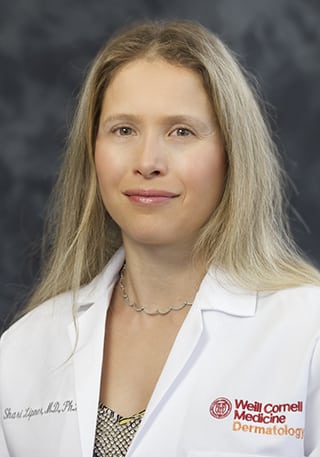Skin and Hair Changes Over Time: A Dermatologist Shares Tips on How to Handle Every Stage
From oily skin to thinning hair, a dermatologist breaks down the changes to expect throughout puberty, pregnancy, and menopause — and what you can do to navigate them.


If you think your skin or hair has changed over time, it’s not your imagination. Skin, your body’s largest organ, can look and feel different as it progresses through life stages like puberty, pregnancy and menopause. And the same is true for your hair, although both evolve in different ways.

“As a dermatologist, I see patients who are getting older and they are surprised by some of the changes that their skin and hair are going through,” says Dr. Shari Lipner, a dermatologist at NewYork-Presbyterian/Weill Cornell Medical Center and an associate professor of clinical dermatology at Weill Cornell Medicine. “It’s a good idea to get educated on what these changes are.”
Health Matters spoke with Dr. Lipner about the common skin and hair changes a person might experience, as well as advice on how to handle each transformation. While Dr. Lipner shares that there’s no magic supplement that’ll prevent all these fluctuations, she says, “There are actually a lot of things people can do to help maintain skin and hair health throughout their life.”
Puberty
What happens to your skin during puberty?
Dr. Lipner: This is when someone might start to notice skin and hair changes. During this period, there’s the release of hormones, such as gonadotropin-releasing hormone, luteinizing hormone (LH) and follicle-stimulating hormone (FSH), which can promote the production of estrogen. And all this together prompts the sebaceous glands — these are oil glands — to make sebum, or oil. So naturally, the face, the skin of the body, and the hair become more greasy. The sebum can also plug the hair follicles on the face; this, in addition to hormonal changes plus bacteria, can lead to acne during puberty.
In the armpits, the apocrine glands become more active and produce sweat, and sweat combined with bacteria will produce an odor.
What are some tips for navigating these changes?
Preteens and teens have to start good habits at this time, like washing their face with a gentle soap, morning and night. That’s really the first step in trying to reduce the sebum on their skin. If someone is using makeup, it’s important to wash the face well with products that are non-comedogenic — so non-follicle clogging.
I think all pre-teens and teens will experience some degree of acne. Some may be mild and not necessarily need treatment by dermatologists, but there are moderate and even severe cases that will need treatment.
What happens to your hair during puberty?
Each hair follicle has a sebaceous gland, so the hair is also going to get oilier. Secondary hairs, such as in the pubic area and armpits, start developing at this time; that can also contribute to the apocrine glands producing the sweat and odor.
What are some tips for navigating these changes?
Kids may have to wash their hair more often at this time. Starting in a person’s 20s, sebum production begins to go down a little bit and you can expect to get to more of a baseline.
Pregnancy
What happens to your skin during pregnancy?
Generally, people may see changes pretty early on in a pregnancy. For instance, there’s a condition called melasma, during which the skin becomes dark around the cheeks, the nose, and forehead; it commonly happens during pregnancy, and is thought to be because of the surge of hormones.
The skin around the nipples, the areola, may darken. And people may also see something called a linea nigra, which is a dark line that runs down the stomach area to the pubic area. This is because hormones cause the pigment-producing cells in the skin to become more active.
What are some tips for navigating these changes?
Sun exposure can worsen this kind of hyper-pigmentation, so the most important thing to do is protect yourself from the sun. Wear a broad-brimmed hat and broad-spectrum sunscreen with SPF 30 or higher.
During pregnancy, we’re not going to actively treat that melasma, because many products wouldn’t be safe to use. As hormone levels balance out post-pregnancy, one may see darkened areas lighten naturally a little bit. But if hyperpigmented areas are still bothersome after pregnancy they may be treated, usually with a topical prescription from a board-certified dermatologist.
The linea nigra will fade slowly, though it’s variable how fast.
What happens to your hair during pregnancy?
The cycle of hair growth has different phases, including a growing, resting and shedding phase. The hair cycle is longer during pregnancy. Our hair also grows faster, as do our nails. After giving birth, some women experience massive shedding. Because the body has gone through a stress, many hairs switch to shedding phase. This is called telogen effluvium.
What are some tips for navigating these changes?
The good news about this type of post-pregnancy hair loss is that it’s completely temporary. All the hairs that were lost are going to completely come back.
While breastfeeding might affect hormones, as they balance out post-pregnancy the hair will also revert to its previous cyclical rhythms.
Perimenopause and Menopause
What happens to your skin during perimenopause and menopause?
There are a lot of changes happening during this time. The production of collagen and elastin, which are proteins that help give skin its firmness and elasticity, is decreasing, so that causes wrinkles to be more apparent. And now most patients will start getting solar lentigines, or sunspots, which are the result of cumulative sun exposure over the years.
Sebum production is going down, so the skin is becoming drier. And fluctuations in hormone levels at this time can also cause acne.
What are some tips for navigating these changes?
The dryness is going to be persistent and get worse as a person gets older, so moisturization becomes very important. Maybe in the 20s and 30s you could get away with skipping the moisturization step, but as you get older, you are going to have to do it. And it’s important to use a thick moisturizer, cream, or ointment.
As for those who experience acne, the good news is that dermatologists have medications we can prescribe to effectively treat it.
What happens to your hair during perimenopause and menopause?
There are a lot of hair changes as well. First, there’s less melanin production in the hair, so a lot of people start turning gray and white. The hair cycle becomes shorter, the hair follicles get thinner; hair that was once very dense and thick is going to start getting thinner. And the scalp gets drier, too.
What are some tips for navigating these changes?
It’s important at this stage to wash hair less since it’s dry. If you would wash your hair every day, you may want to wash it every three days and see if that makes a difference. Washing less may also help decrease shedding.
Outside of changes that naturally occur as a person ages, are there lifestyle habits that can affect the skin and hair?
The sun will cause skin cancers, sunspots, and wrinkles, so sun avoidance is super important. Not smoking will also help preserve skin health.
When it comes to your hair, a stressful event — the loss of a loved one, or being sick with COVID-19, for example — can cause a surge in hair shedding.
But there’s a lot you can do to keep your hair healthy: Try limiting certain habits like wearing tight hairstyles, doing a lot of blow-drying and heat styling, along with perming and bleaching, which can thin out the hair and cause breakage.
Are there any hair or skin changes that should prompt a person to see a dermatologist?
If you’re moisturizing with a thick moisturizer and you’re still feeling super dry or itchy, you should see a dermatologist; you may have another dermatologic condition that needs to be diagnosed and treated.
And while it’s normal for people to lose hair as they get older, a dermatologist can help treat hair loss to help a person’s self-esteem and quality of life.

